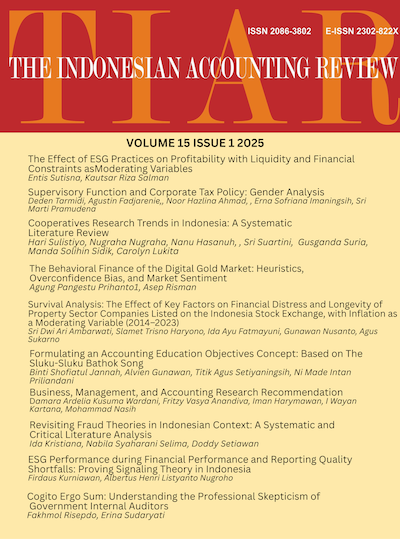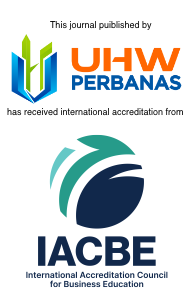The Behavioral Finance of the Digital Gold Market: Heuristics, Overconfidence Bias, and Market Sentiment
DOI:
https://doi.org/10.14414/tiar.v15i1.4882Keywords:
Behavioral finance, heuristic, overconfidence bias, market sentiment, investment decisions, digital gold marketAbstract
This study aims to analyze the effect of heuristic and overconfidence biases on investment decision-making through market sentiment. This study was conducted on the digital gold market which has never existed in previous studies, this study also uses market sentiment as a mediating variable. The study population consists of 5,628 investors in the digital gold market at JFX, with a sample of 200 respondents obtained using the convenience sampling technique. The data analysis method employed is Structural Equation Modeling (SEM) using the Smart PLS application. The results of the study show that heuristics do not influence investment decision-making, either directly or through market sentiment. Conversely, overconfidence bias exerts a notable positive impact on investment decision-making, both directly and indirectly through market sentiment. Although investors often utilize heuristics, these do not directly contribute to investment decision-making. Overconfidence bias, which reflects excessive confidence in one's abilities, plays an important role in investment decisions. This study contributes to understanding how biases affect investment behavior and emphasizes the importance of market sentiment in mediating these effects.
References
Ahmad, M., Wu, Q., & Abbass, Y., (2022). Probing The Impact of Recognition Based Heuristic Biases on In-vestment Decision Making and Performance. Kyber-netes, 52(10), 4229-4256. DOI: 10.1108/K-01-2022-0112
Baker, M., & Wurgler, J. (2006). Investor Sentiment and The Cross Section of Stock Return. The Journal of Finance, 61(4), 1645-1680. DOI:10.1111/j.1540-6261.2006.00885.x
Barberis, N., & Huang, M. (2020). The Impact of Overcon-fidence on Investment Decisions. Review of Financial Studies, 33(5), 1415-1444. DOI: 10.1093/rfs/hhz048
Bodie, Z., Kane, A., & Marcus, A. J. (2017). Investments and Portfolio Management (11th ed.). New York, NY: McGraw-Hill Professional Publishing, 410-411.
Chen, L., & Zhang, Y. (2019). Revisiting the Efficient Mar-ket Hypothesis: Evidence from the Chinese Stock Market. Journal of Business and Economics, 24(2), 145-162. DOI: 10.1080/08963623.2019.1583451
Doan, M. P., Alexeev, V., & Brooks, R. (2016). Concurrent momentum and contrarian strategies in the Austral-ian stock market. Australian Journal of Manage-ment, 41(1), 77-106.
Fama, EF (1970), Efficient Capital Markets: a Review of Theory and Empirical Work, Journal of Finance, 25(1), 383–417.
Fang, H., Guo, R., & Zhang, J. (2020). Stock price devia-tions from Fundamental Values: Evidence from the Shanghai Stock Exchange. Journal of Financial Eco-nomics, 135(1), 1-17 DOI: 10.1016/j.jfineco.2019.02.004
Galavotti, I., Lippi, A. and Cerrato, D. (2021), The repre-sentativeness heuristic at work in decision-making: building blocks and individual-level cognitive and be-havioral factors, Management Decision, 59(7), 1664-1683. DOI:10.1108/MD-10-2019-1464
Gervais, S., & Odean, T. (2019). Overconfidence and In-vestment Decisions. Journal of Financial Economics, 133(2), 301-314. DOI: 10.1016/j.jfineco.2019.02.004
Gupta, P., & Karim, R. A. (2022). Revisiting the Efficient Market Hypothesis: A Study on the Indian Stock Market. International Journal of Management and Commerce, 10(2), 1-14.
Jain, J., Walia, N., Singla, H., Singh, S., Sood, K., & Gri-ma, S., (2023). Heuristic Biases as mental Shortcuts to Investment Decision-Making: A Mediation Analy-sis of Risk Perception. Risks, 11(4), 1-22. DOI:10.3390/risks11040072
Johnson, E. J., & Tversky, A. (2019). Heuristics and Biases in Financial Decision Making. Journal of Behavioral Finance, 20(2), 1-13. DOI:10.1080/15427560.2019.1571451
Johnson, K., & Lee, S. (2023). The Efficient Market Hy-pothesis in the Digital Age: A Survey of Recent Re-search. Journal of Financial Economics, 143(1), 12-28. DOI: 10.1016/j.jfineco.2022.09.002
Khan, M. A., & Rizvi, S. A. R. (2023). Sentiment Analysis and Its Impact on Market Behavior: Evidence from Financial News. Journal of Behavioral Finance, 24(1), 45-60. DOI: 10.1080/15427560.2023.2171234.
Li, M., & Zhang, Y. (2020). The Impact of Heuristics on Investment Decisions. Journal of Financial Plan-ning, 33(2), 55-66. DOI: 10.1080/10928440.2020.1723511
Qasim, M., Hussain, R. Y., Mehboob, I., & Arshad, M. (2019). Impact of Herding Behavior and Overconfi-dence Bias on Investors’ Decision-Making in Paki-stan. Accounting, 5(2), 81–90. DOI: 10.5267/j.ac.2018.7.001
Risman, A., Mulyana, B., Silvatika, B., & Sulaeman, (2021), A. The Effect of Digital Finance on Financial Stability. Management Science Letters, 11(7), 1979-1984. DOI: 10.5267/j.msl.2021.3.012
Risman, A., Prowanta, E. & Siswanti, I. (2021). Behavioral Corporate Finance. Yogyakarta: Penerbit KBM. 2-8. Indonesia. ISBN: 9786236297551
Risman, A., Markonah, M., Mubarok, J., & Saputra, B. L. E. (2024). The Islamic Perspective of Gold-Based In-vestment: The Case of Indonesia. Tazkia Islamic Fi-nance and Business Review, 18(1), 1–17. DOI: 10.30993/tifbr.v18i1.363
Risman, A. (2024). The Behavioral Islamic Finance: Con-ceptual Framework and Literature Review. Indone-sian Interdisciplinary Journal of Sharia Economics (IIJSE), 7(2), 3216-3230. DOI: 10.31538/iijse.v7i2.5071
Ritter, J. R. (1991). The Long‐Run Performance of initial Public Offerings. The Journal of Finance, 46(1), 3–27.
Ross, S.A. (1976) The Arbitrage Theory of Capital Asset Pricing. Journal of Economic Theory, 13(3), 341-360. DOI: 10.1016/0022-0531(76)90046-6
Shiller, R. J. (1981). Do Stock Prices Move Too Much? American Economic Review, 71(5), 853-865. DOI: 10.2307/1807293
Shiller, R. J. (2000). Irrational Exuberance. Princeton Uni-versity Press. 135-203. ISBN: 9780691047441
Sihombing, Y., & Prameswary, R. (2023). The Effect of Overconfidence Bias and Representativeness Bias on Investment Decision With Risk Tolerance as Mediat-ing Variable. Indikator: Jurnal Ilmiah Manajemen dan Bisnis, 7(1), 1-12. DOI: 10.22441/indikator.v7i1.18396
Shrestha, P. M. (2020). Factors Influencing Investment Decisions of Nepalese Investors. Management Dy-namics, 23(2), 145–160. DOI: 10.3126/md.v23i2.35818
Singla, H., Singh, S., Sood, K., & Grima, S. (2023). Heuris-tic biases as mental shortcuts to investment decision-making: A mediation analysis of risk perception. Risks, 11(4), 2-22. DOI: 10.3390/risks11040072
Smith, J. (2020). Market efficiency in Emerging Markets: Evidence from Indonesian Stock Market. Journal of Financial Research, 43(2), 205-220
Soraya, R., Risman, A., & Siswanti, I. (2023). The Role of Risk Tolerance in Mediating The Effect of Overconfi-dence Bias, Representativeness Bias and Herding on Investment Decisions. Journal of Economics, Fi-nance and Management Studies, 6(7), 3324-3335. DOI: 10.47191/jefms/v6-i7-36
Tversky, A. and Kahneman, D. (1973) Availability: A Heu-ristic for Judging Frequency and Probability. Cogni-tive Psychology, 5(2), 207-232.
William, A. (2021). The Efficient Market Hypothesis and its Limitations: A Review of the Literature. Journal of Economic Issues, 55(4), 1049-1064. DOI: 10.1080/00213624.2021.1962451
Yulianto, A., Siswanti, I., Risman, A., & Sihombing, P. (2024). The Influence of Sharia Financial Literacy and Sharia Financial Inclution Through Islamic Fintech on Sharia Financial Transaction on BUS in Indone-sia. Journal of Management and Economic Studies, 6(1), 1-16. DOI: 10.26677/TR1010.2024.1379.
Downloads
Submitted
Published
How to Cite
Issue
Section
License
Copyright (c) 2025 The Indonesian Accounting Review

This work is licensed under a Creative Commons Attribution-NonCommercial 4.0 International License.

















